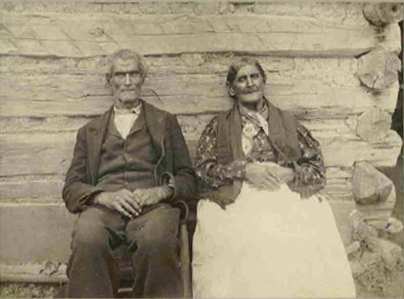
Research at the National Archives at Fort Worth
- Directions
- Genealogy Research
- Historical Research
- Bankruptcy Case Files
- Photocopying
- Public Programs
Children under the age of 14 will be admitted to National Archives facilities only if they are accompanied by an adult who will supervise them at all times while on National Archives property.
Directions
1400 John Burgess Drive
Fort Worth, Texas 76140
From I-20 W
1. Slight left at I-20 W (signs for Abilene/I-20 W)
2. Take exit 439 toward Campus Dr.
3. Turn left at Campus Dr.
4. Continue on Oak Grove Rd.
5. Turn right at John Burgess Dr.
From I-35 W
1. Continue on I-35W S
2. Take exit 42 toward Everman Pkwy
3. Turn left at W Everman Pkwy
4. Turn left at S Will Rogers Blvd
5. Turn right at John Burgess Dr.
Genealogy Research
Resources available at The National Archives at Fort Worth include free access to computer databases, microfilm publications containing records from across the National Archives and one-of-a-kind records of genealogical value.
New to genealogy? Our staff and volunteers are available to get you started!
Free online
Some of the most frequently used records are listed below.
- Federal population censuses, 1790-1940 (most of the 1890 schedules were destroyed by fire in 1921).
- Passenger arrival records.
- Passport application files.
- American Revolution military service records and pension and bounty land warrant application files.
- Mexican border crossings from 1903 and Canadian border crossing records from 1895.
- Select American Civil War Union service records and all Confederate military service records; and indexes to compiled military service records for other wars.
- Dawes census cards, enrollment jackets and land allotment jackets for the Five Tribes of Oklahoma.
- Naturalization Records including declarations of intent and petitions.
For more information about online databases
Microfilm readers and public access computers are available without an appointment. All computers and the microfilm reader/printer are equipped with a USB port which enables you to save files to a thumb drive. Be sure to bring your own thumb drive.
Additional help:
NARA's Online Microfilm Catalog, which allows researchers to determine the microfilm publications held by the Fort Worth facility.
The Genealogy section, for additional general information about NARA's genealogical resources.
Genealogy Links from the Archives Library and Information Center, with links for how to do genealogical research, genealogy resources around the world, and databases of family trees.
Genealogical Resources on the World Wide Web, for links to non NARA genealogical web sites.
- E-mail your inquiry to ftworth.archives@nara.gov *
- Call the Fort Worth facility at 817-551-2051.
Historical Research
Original records
The National Archives at Fort Worth has more than 138,000 cubic feet of archival holdings dating from 1800 to the 1990's, including textual documents, photographs, and maps. These archival holdings were created or received by the Federal courts and 100 Federal agencies in Arkansas, Oklahoma, Louisiana, and Texas. Federal law requires that agencies transfer permanently valuable, non-current records to NARA.
Among the subjects covered are regional and national history from the early 1800's with emphasis on westward expansion to the Southwest and the settlement of Native Americans (particularly Cherokees, Choctaws, Chickasaws, Creeks, and Seminoles) in Indian Territory; the Civil War, slavery, Chinese exclusion, repatriation, segregation, World Wars I and II, economic development, oil, and the space program. Historic names and topics include Jackson Burnett, Bonnie and Clyde, the Blue Angels, the Dalton Gang, Wyatt Earp, Billie Sol Estes, Henry O. Flipper, the Green Corn Rebellion, O. Henry, Andrew Jackson, Machine Gun Kelly, Jean Lafitte, Madalyn Murray O'Hair, Isaac Parker, Belle Starr, and the Texas City disaster.
Archival holdings are arranged by record group (RG), a body of records from an agency or bureau, identified by an RG number. Selected finding aids, including a comprehensive guide to the archival holdings, are available by mail and online. Research can be initiated in person, by telephone, mail, fax, or electronic mail at ftworth.archives@nara.gov. Individuals who wish to use archival holdings on-site will facilitate their research by calling before visiting and making an appointment.
Before using archival holdings, every researcher must obtain a researcher identification card. An applicant must show identification that includes a photograph, such as a driver's license, passport, or school or business identification card, and complete a short form giving name, address, telephone number, and a brief description of the proposed research topic. A researcher ID card, valid for one year and renewable, is then issued. It must be presented during each research visit. The card cannot be issued in advance of your visit.
Photocopying / Scanning
Our self-service copier is available for 25 cents a page (up to 11 x 17 inches). It will also scan to your own USB thumb drive (we do not supply any thumb drives).
The staff will make or arrange for copies or scans of oversized documents, certified copies for legal use, photographs, or other specialized reproductions. Fees vary depending on the size and type of reproduction. The availability of photocopies and scans depends on the physical condition of the documents.
Public Programs
Public programs include workshops on researching various genealogical and historical topics.
